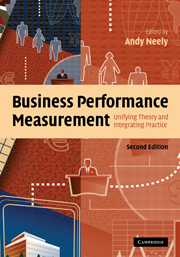Book contents
- Frontmatter
- Contents
- List of figures
- List of tables
- List of boxes
- List of contributors
- Introduction
- Part I Performance measurement – functional analyses and theoretical foundations
- 1 Accounting performance measurement: a review of its purposes and practices
- 2 Measuring marketing performance: research, practice and challenges
- 3 Measuring performance: the operations management perspective
- 4 Measuring performance: the supply chain management perspective
- 5 Finding performance: the new discipline in management
- 6 A conceptual and operational delineation of performance
- Part II Performance measurement – frameworks and methodologies
- Part III Performance measurement – practicalities and challenges
- Part IV Performance measurement in public services
- Part V Performance measurement – emerging issues and enduring questions
- Index
- References
1 - Accounting performance measurement: a review of its purposes and practices
Published online by Cambridge University Press: 22 September 2009
- Frontmatter
- Contents
- List of figures
- List of tables
- List of boxes
- List of contributors
- Introduction
- Part I Performance measurement – functional analyses and theoretical foundations
- 1 Accounting performance measurement: a review of its purposes and practices
- 2 Measuring marketing performance: research, practice and challenges
- 3 Measuring performance: the operations management perspective
- 4 Measuring performance: the supply chain management perspective
- 5 Finding performance: the new discipline in management
- 6 A conceptual and operational delineation of performance
- Part II Performance measurement – frameworks and methodologies
- Part III Performance measurement – practicalities and challenges
- Part IV Performance measurement in public services
- Part V Performance measurement – emerging issues and enduring questions
- Index
- References
Summary
Introduction
Accounting measures of performance have been the traditional mainstay of quantitative approaches to organizational performance measurement. However, over the past two decades a great deal of attention has been paid to the development and use of non-financial measures of performance that can be used both to motivate and report on the performance of business (and other) organizations. The impetus for such developments has come from the bottom and the top of the organization alike. Much performance management at the operational level is carried out using specific indicators of performance that are usually not measured in financial terms. At the most senior levels, although financial performance is inevitably a major consideration, there has been an increasing recognition that other important factors in the effective running of the organization cannot be well captured by such measures. Thus, non-financial performance measures have undergone significant development, to the relative neglect of the development of improved financial measures. However, the recent publicity surrounding the marketing of economic value added (EVA®) as an overall measure of company performance by management consultants Stern Stewart can be seen as a sign of a new emphasis on the financial aspects of performance.
The purpose of this chapter is to review the roles and functions of financial measures of organizational performance, and to outline the major features of their development, particularly in the last thirty years.
Information
- Type
- Chapter
- Information
- Business Performance MeasurementUnifying Theory and Integrating Practice, pp. 11 - 35Publisher: Cambridge University PressPrint publication year: 2007
References
Accessibility standard: Unknown
Why this information is here
This section outlines the accessibility features of this content - including support for screen readers, full keyboard navigation and high-contrast display options. This may not be relevant for you.Accessibility Information
- 12
- Cited by
